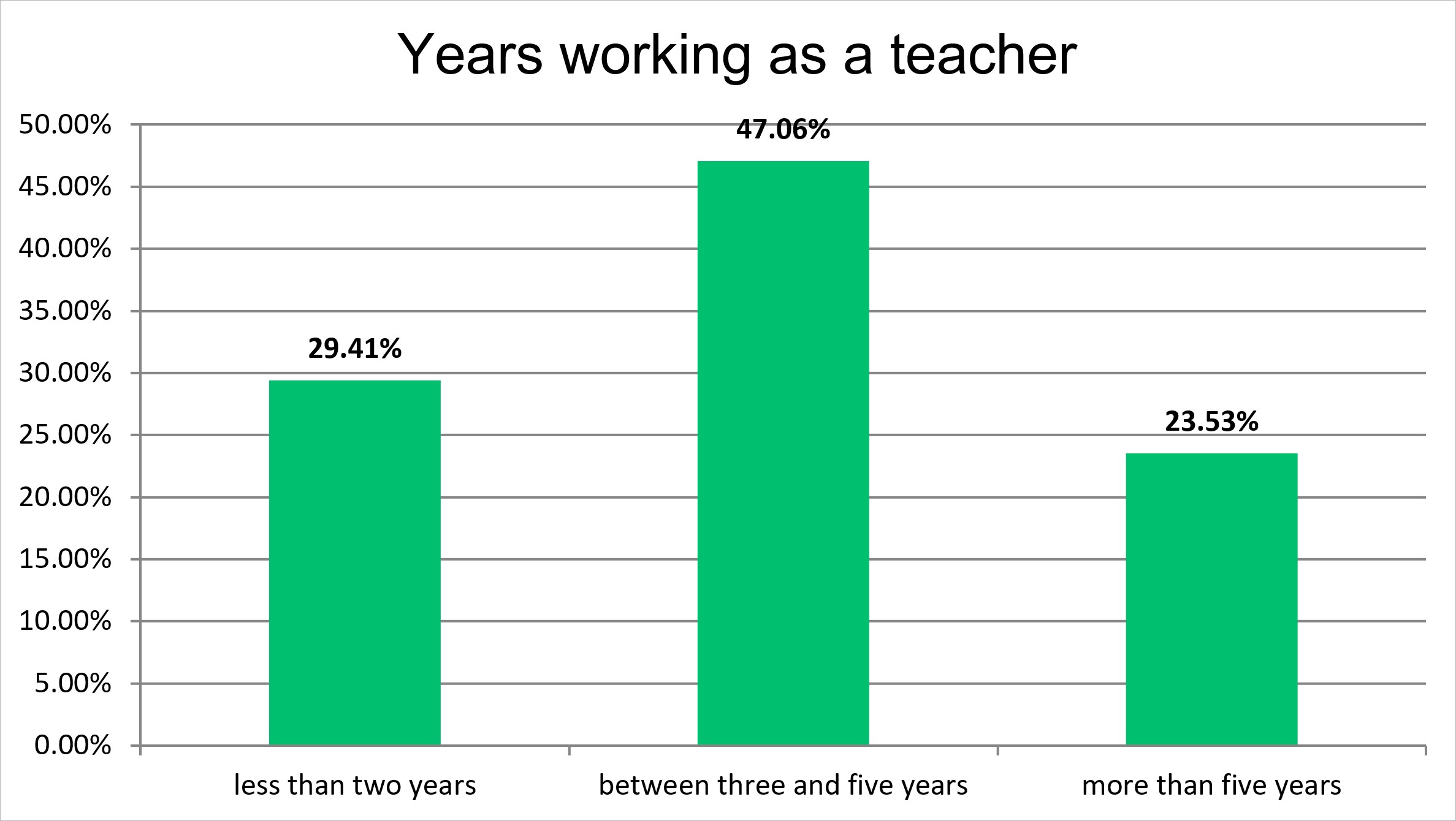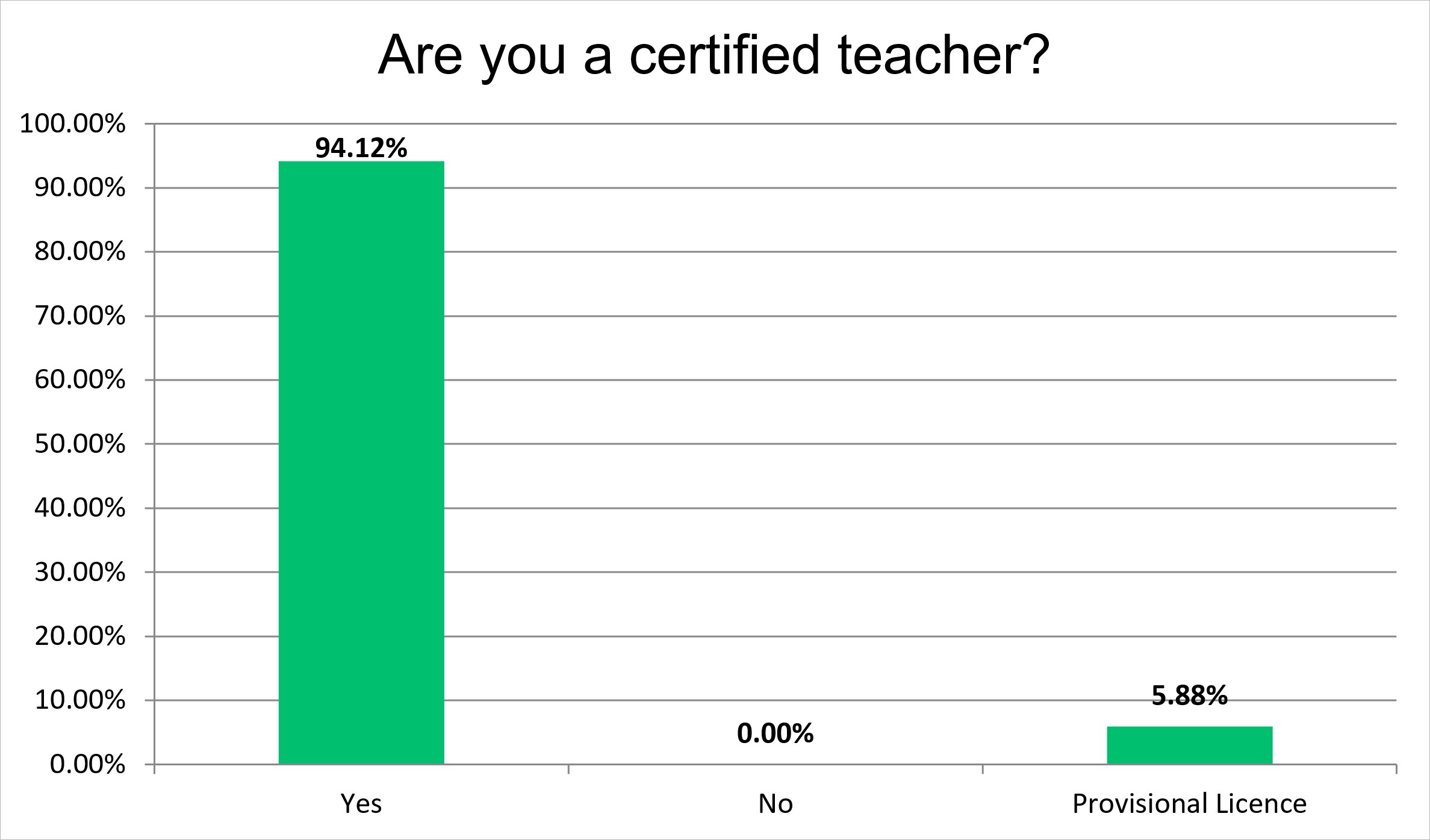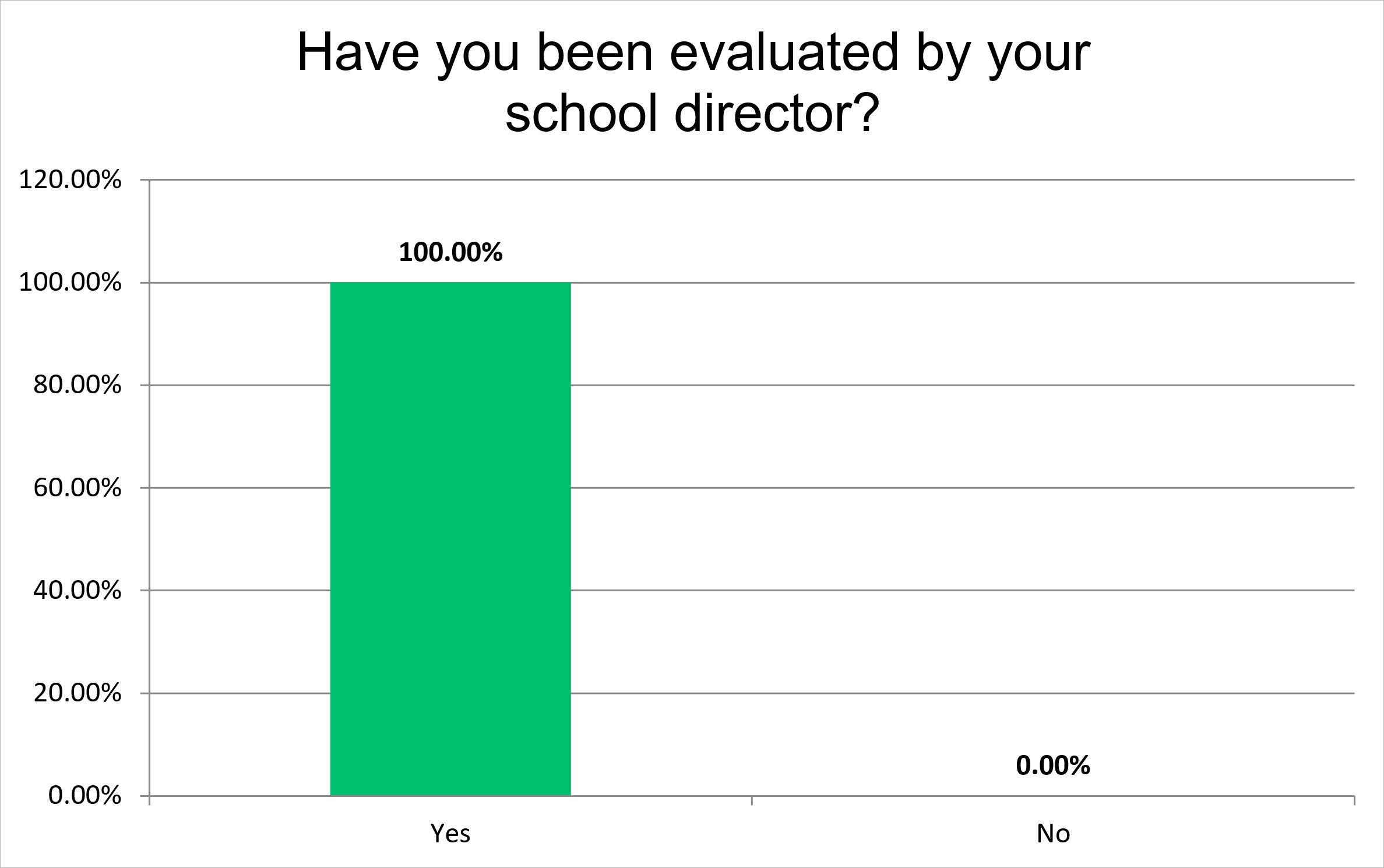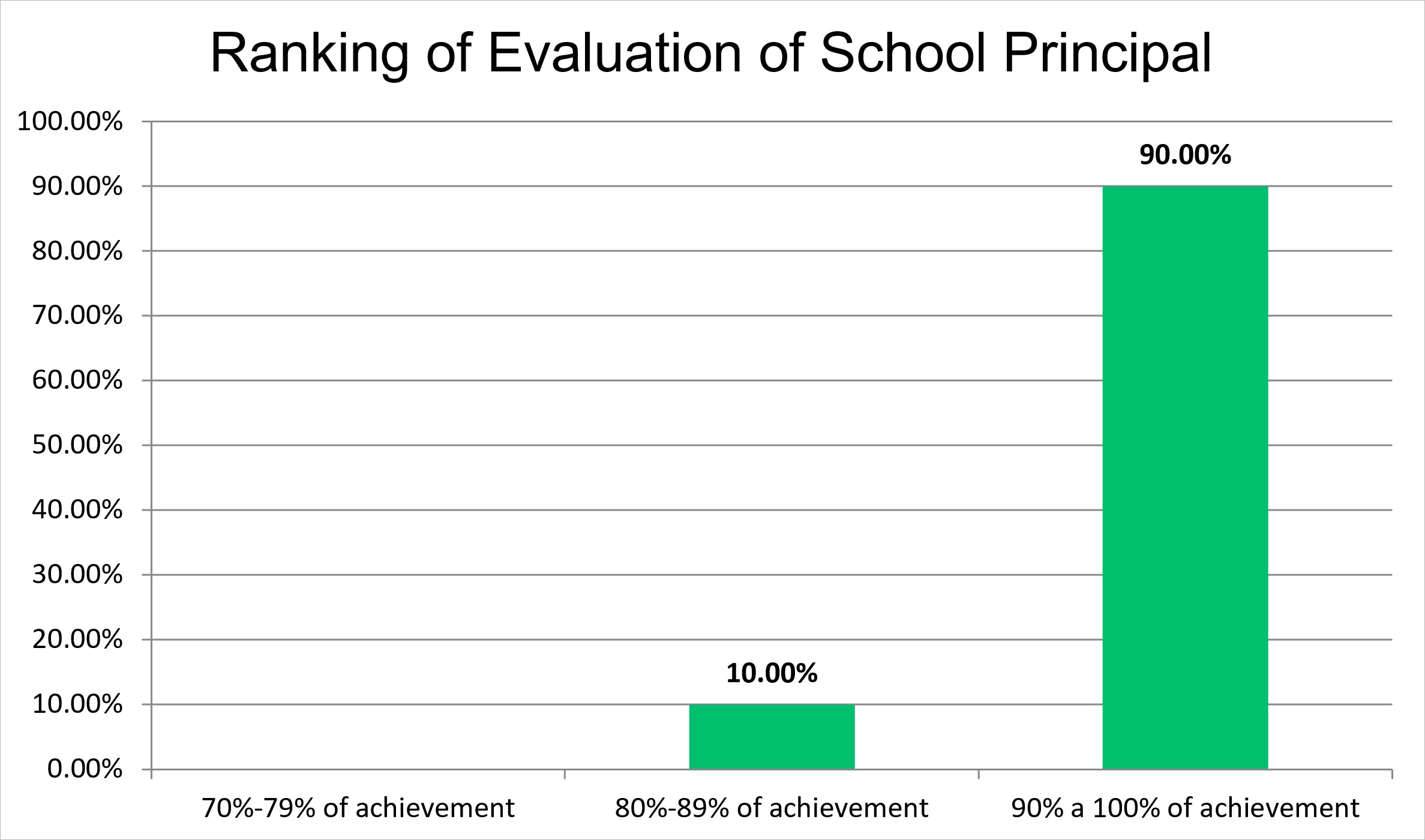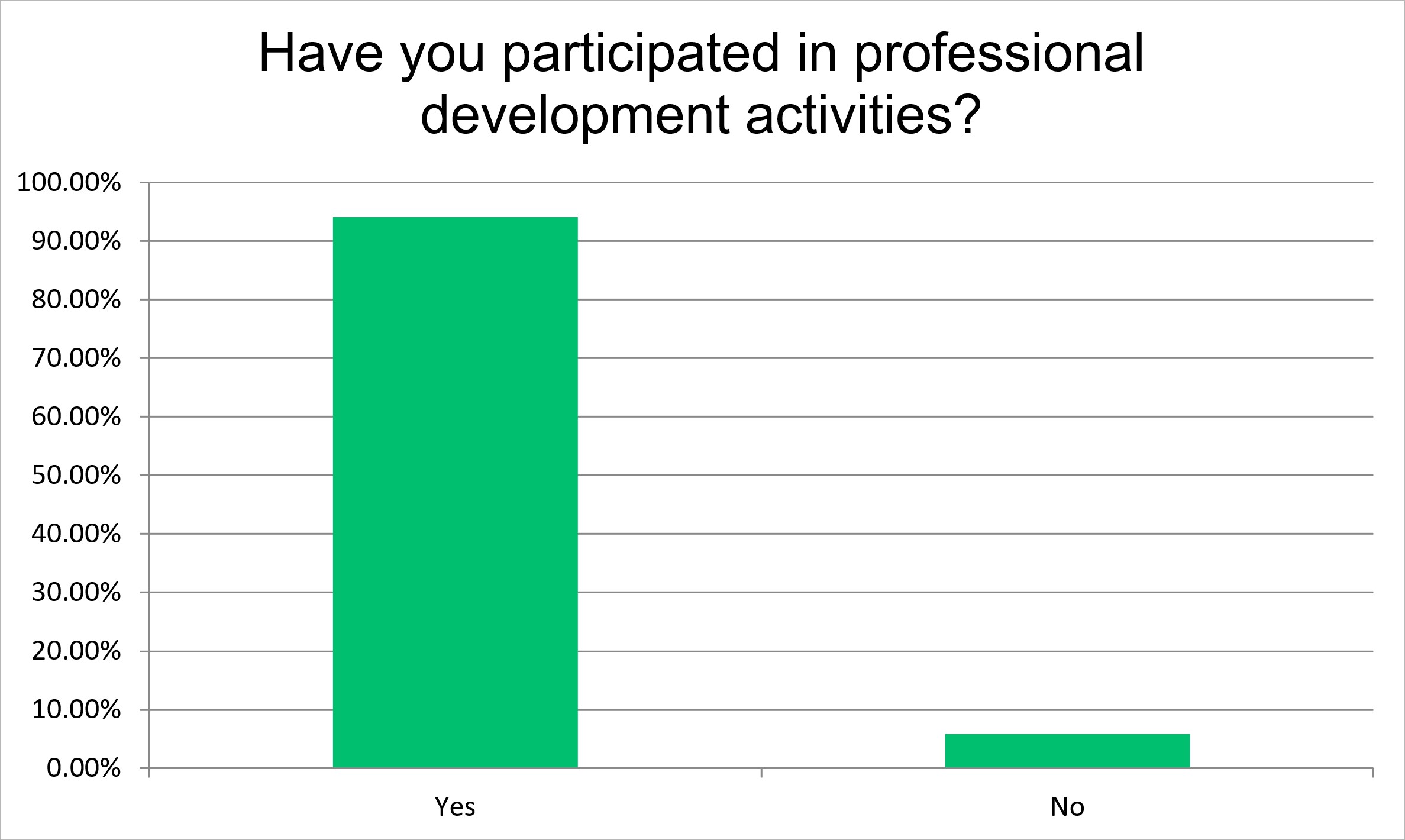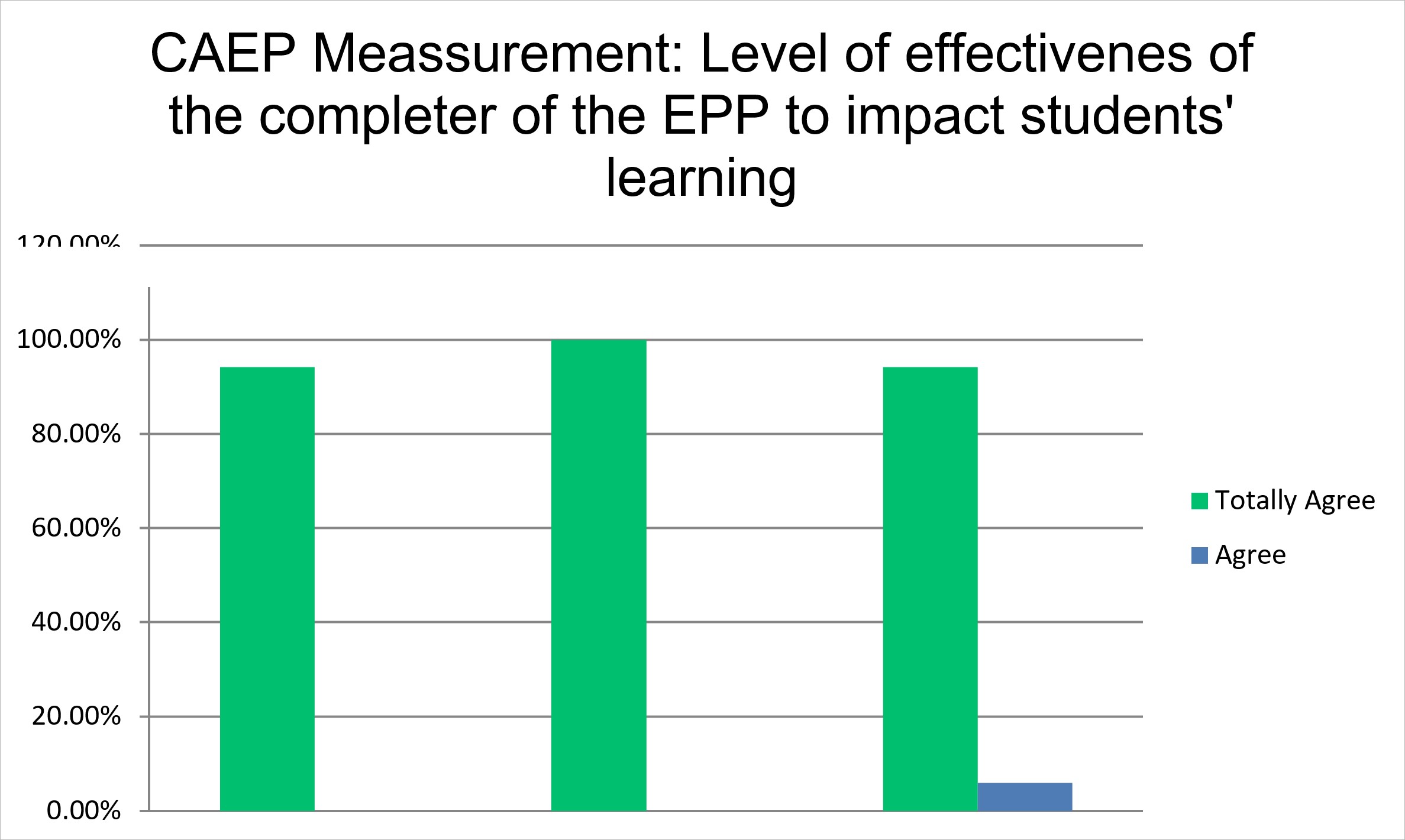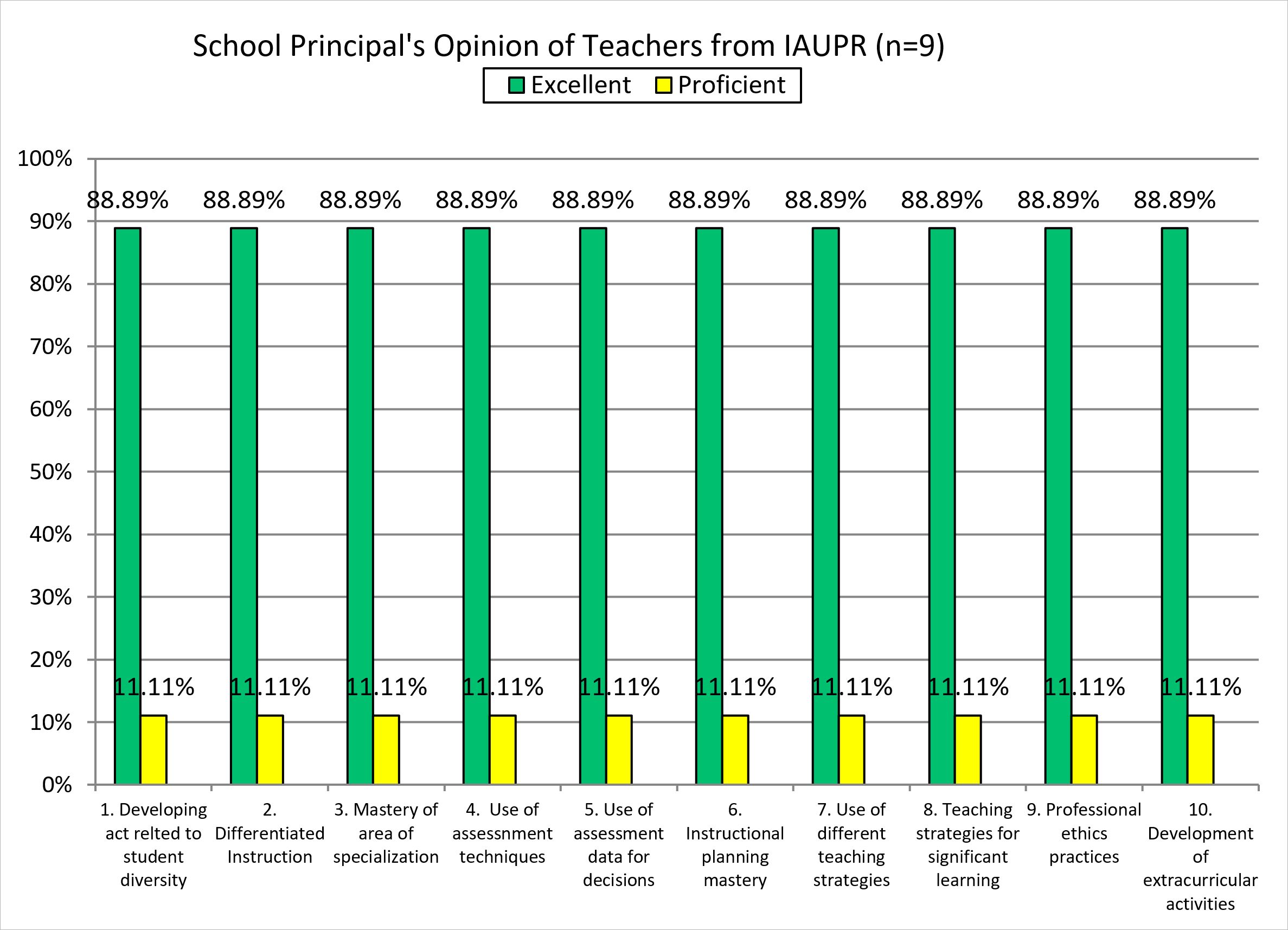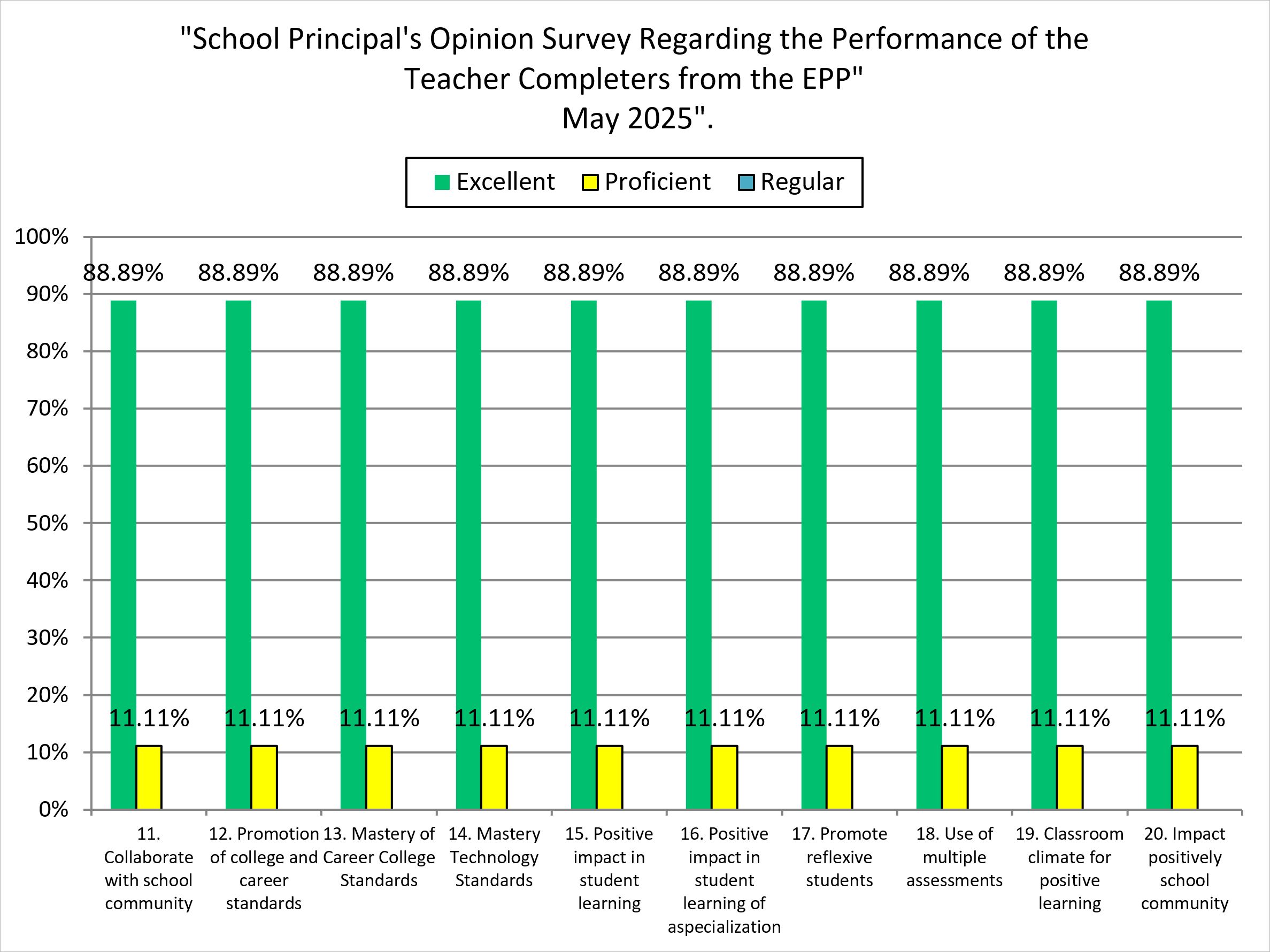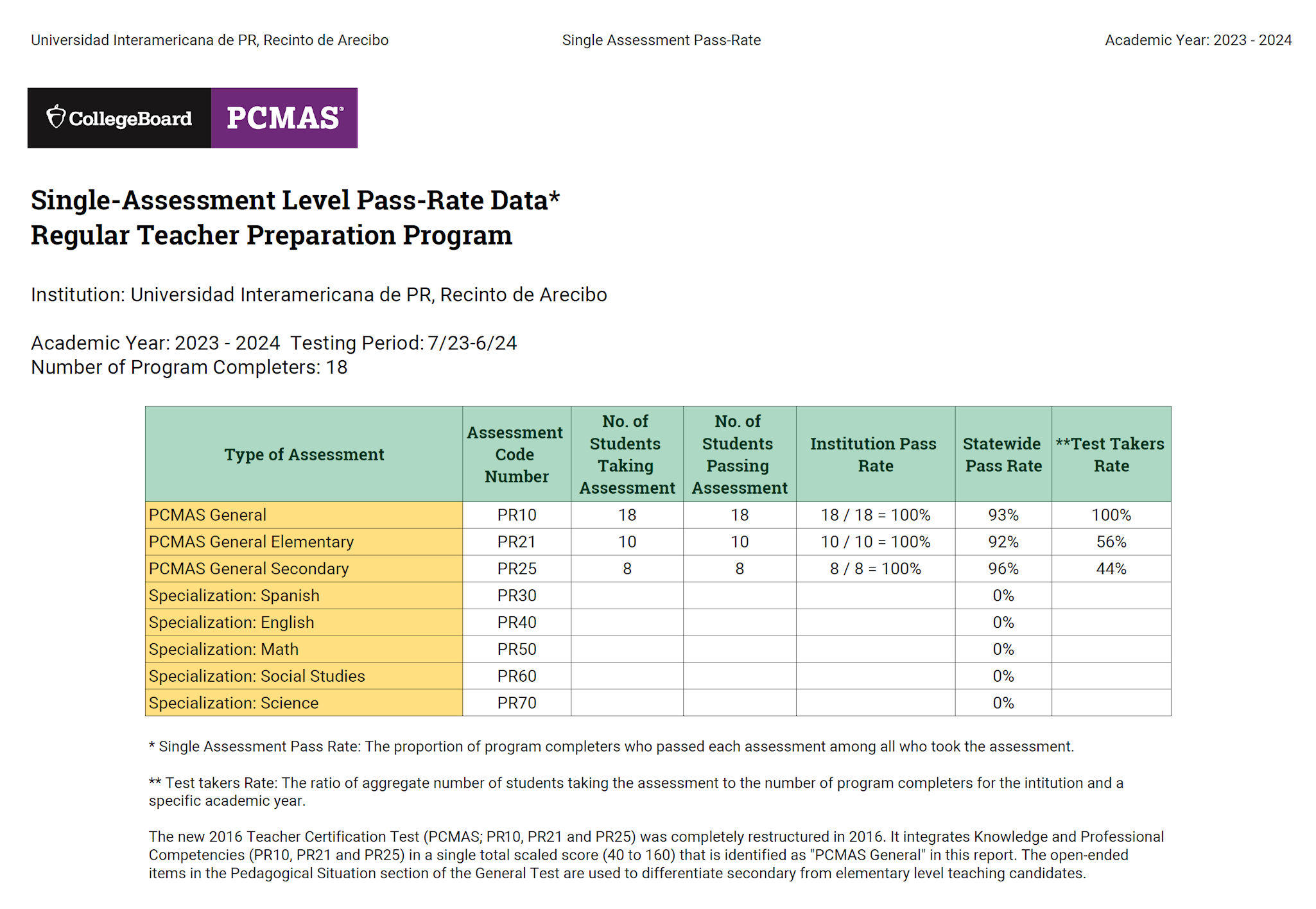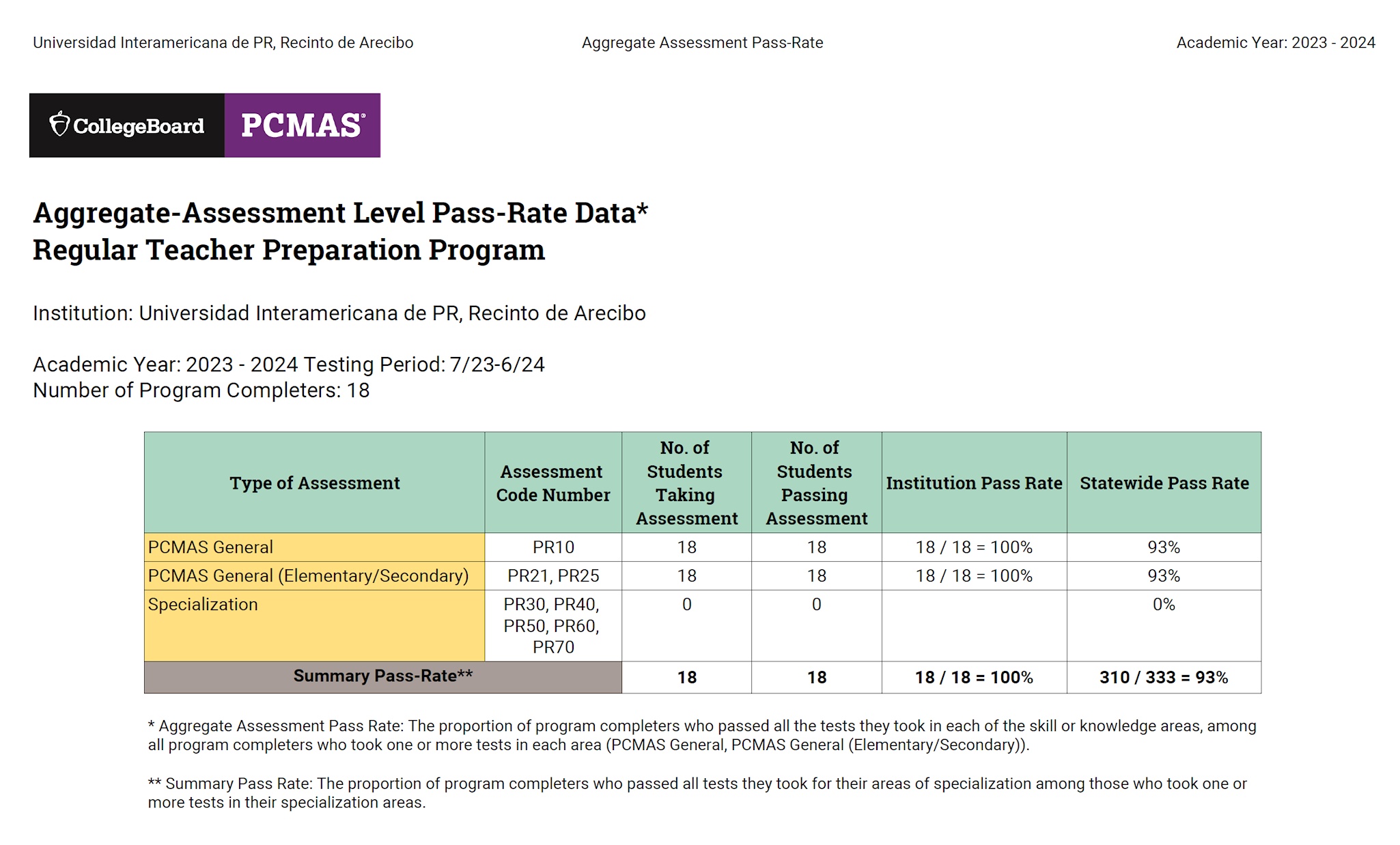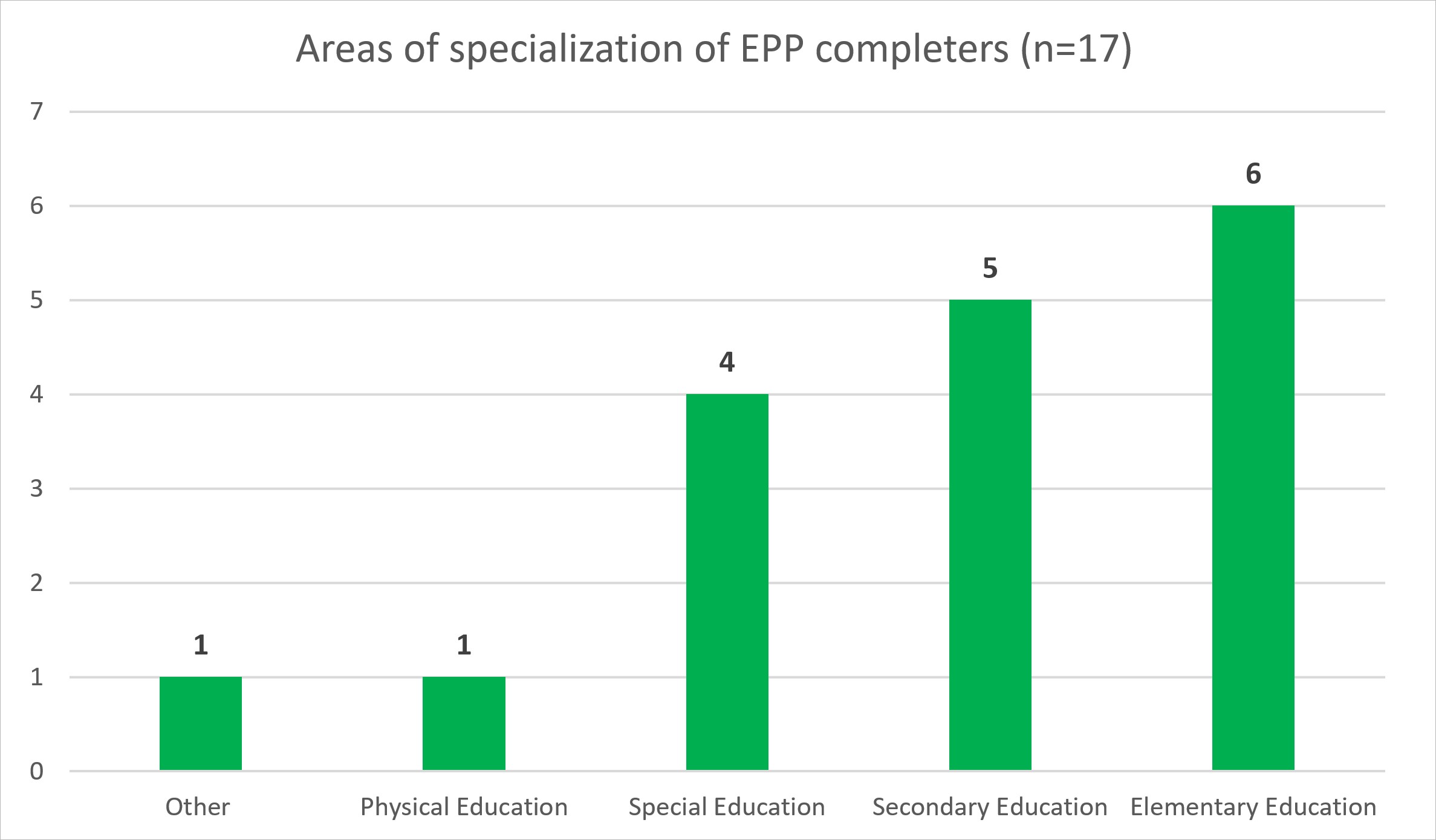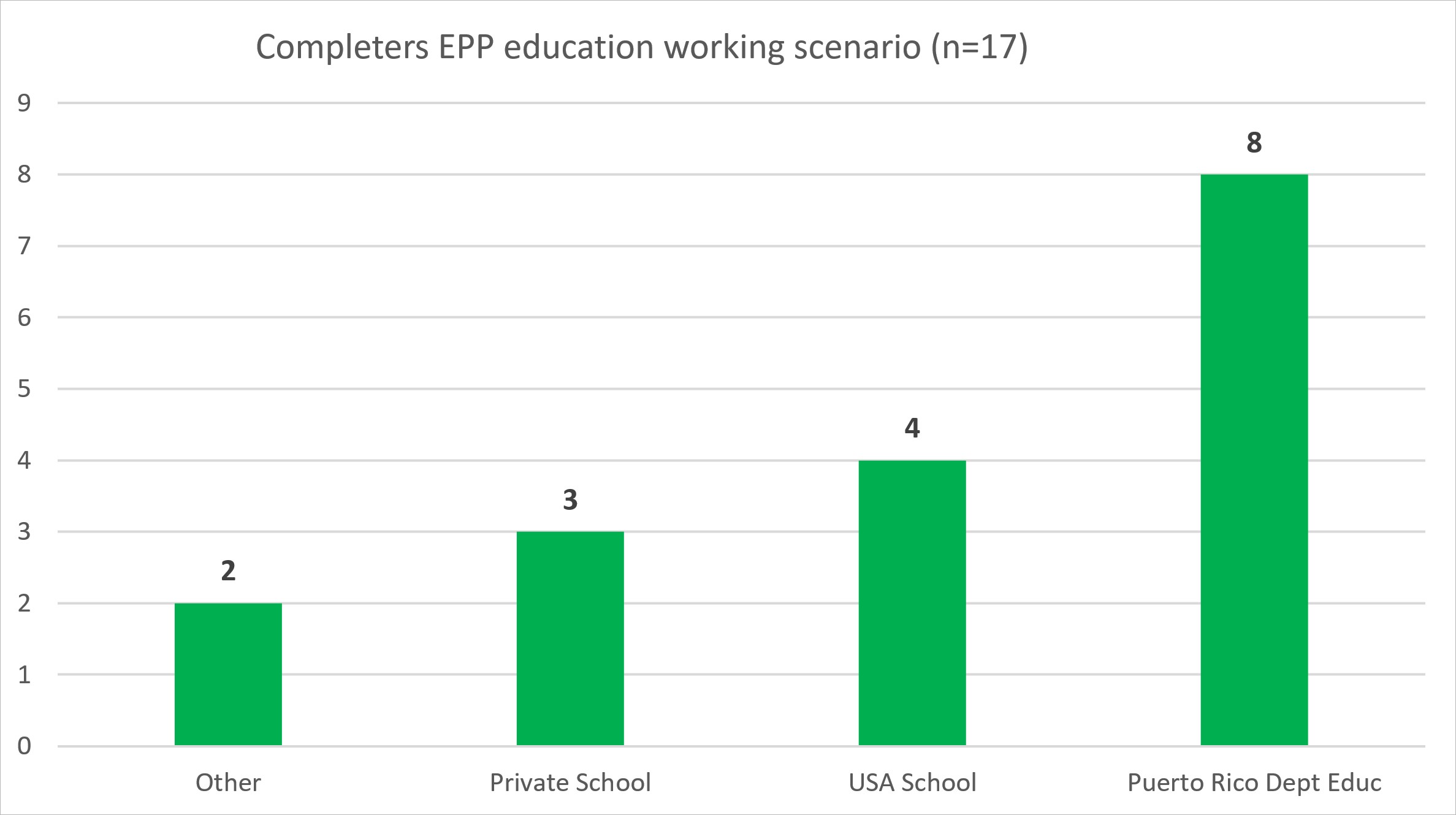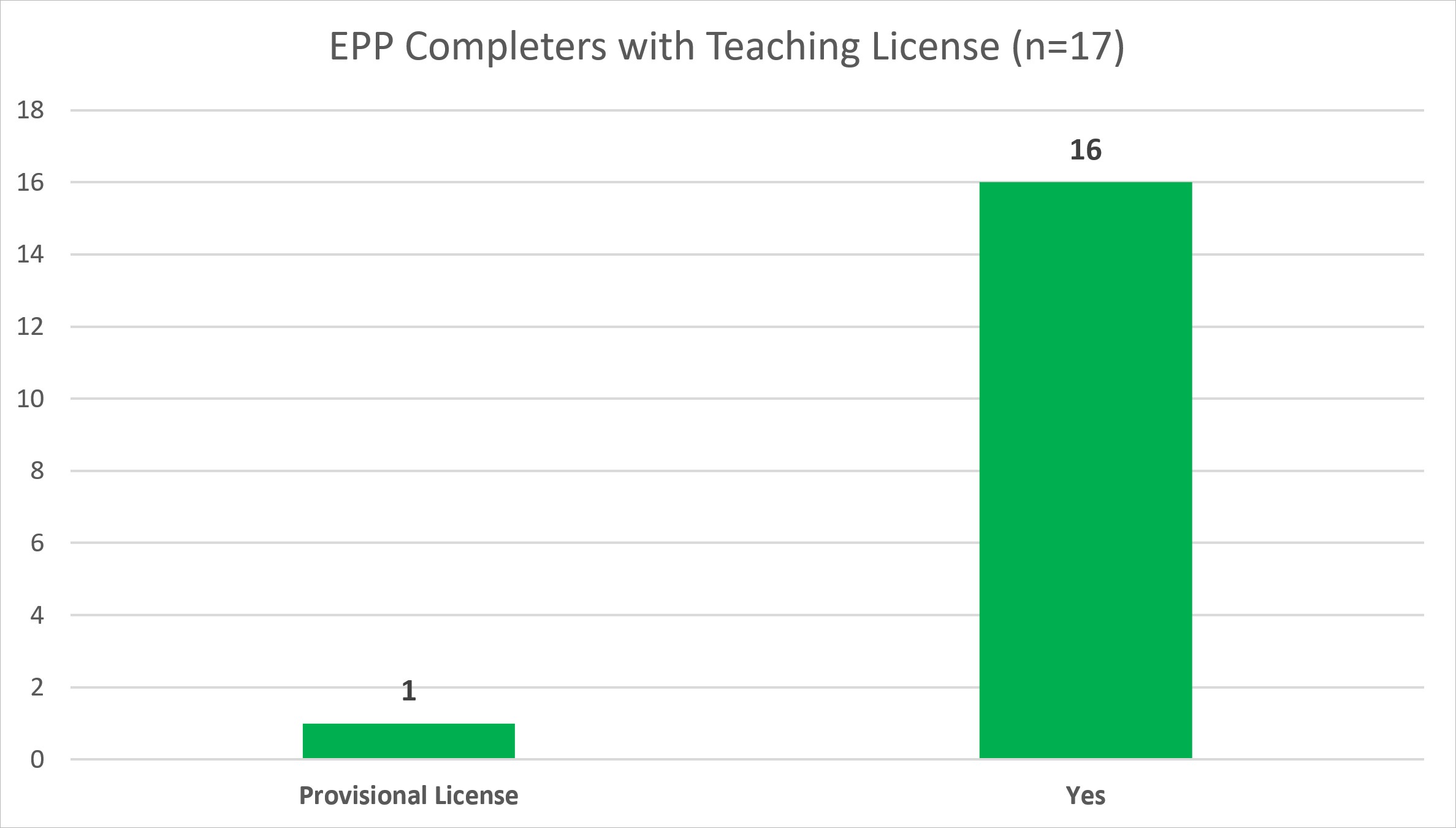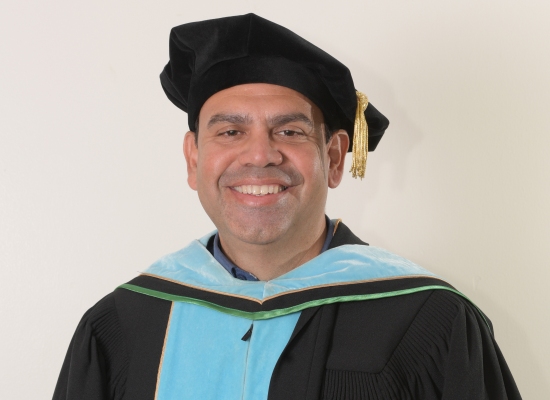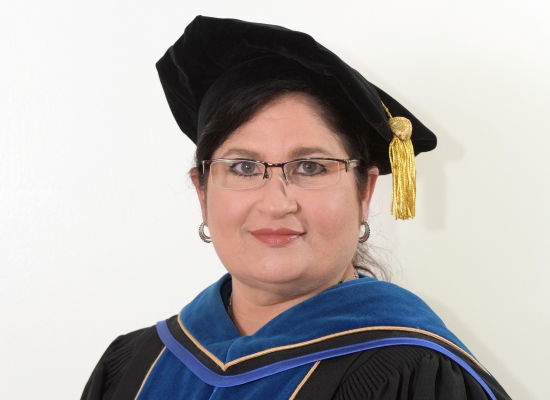
Oferta Académica (Bachilleratos)
Educación Especial K-12 *
Educación Preescolar *
Educación Elemental
Educación Física K-12
Educación Inglés K-12 *
Educación Secundaria
Educación en Salud Escolar * (solamente se ofrece a distancia)
* Disponibles también totalmente a distancia
Educación Especial K-12 *
Educación Preescolar *
Educación Elemental
Educación Física K-12
Educación Inglés K-12 *
Educación Secundaria
Educación en Salud Escolar * (solamente se ofrece a distancia)
* Disponibles también totalmente a distancia
Programa de Educación de Maestros
 CAEP Accountability Measures for CHEA Requirements 2025 Report
CAEP Accountability Measures for CHEA Requirements 2025 ReportCAEP includes four Accountability Measures that the Inter American University, Arecibo Campus, needs to make available to the public. These measures are related to our Teacher Education Licensures approved by the Department of Education of Puerto Rico:
Bachelor’s in Arts in Education in:
- Early Childhood (Pre-School)
- Elementary Educ (K-3rd Grade)
- Elementary Educ (4-5th Grade)
- Physical Education
- Special Education
- Health Education
- Secondary Education in ESL
- Secondary Education in Mathematics
- Secondary Education in Spanish
- Secondary Education in Biology
This Measures includes the data, collected during the 2023-2024 academic year, related to the following areas: Measure 1: Completer effectiveness, Measure 2: Satisfaction of employers and stakeholder involvement, Measure 3: Candidate competency at completion, and Measure 4: Ability of completers to be hired.
MEASURE 1: Completer Effectiveness
Summary of Teacher of EPP Completer Survey Results (INTER Arecibo, 2025)
To assess the impact and quality of our educator preparation program (EPP), we administered a structured survey to recent program completers from the Arecibo campus of the Inter American University (n=17). This tool was designed to collect self-reported data regarding their effectiveness in the classroom, their certification status, professional development participation, and perceptions of how well their preparation aligned with real-world teaching responsibilities.
R4.1 – Completer Effectiveness
The results indicate that program completers:
- Contribute to student-learning growth
In response to the prompt “My results demonstrate that 75% of my students show learning progress,” an overwhelming 94% of completers “Totally Agreed”, with no respondents disagreeing. This strongly suggests that our graduates feel confident in their ability to positively impact P-12 learning outcomes. - Apply professional knowledge and skills in P-12 classrooms
Completers consistently agreed or totally agreed with statements reflecting professional responsibilities, such as: - Providing diverse and inclusive learning experiences
- Commitment to improving student learning
- Engagement in reflective and collaborative practices
Notably, 90% reported achieving performance evaluations between 90%–100%, and 94% have participated in professional development activities, indicating strong engagement in continuous improvement and application of learned pedagogical strategies.
- Rationale for data elements
The survey included both categorical and scaled responses aligned to CAEP indicators. It measured perceived impact on student learning, use of inclusive practices, certification status, and engagement in professional growth—all aligned to the competencies emphasized throughout our curriculum.
R4.2 – Employer Satisfaction
Although the data here was gathered from completers themselves, not directly from employers, the high rate of positive performance evaluations (as reported by the completers) offers an indirect measure of employer satisfaction. Specifically:
- 100% of completers had been evaluated by their school directors, and the vast majority received favorable evaluations (80–100%+ range).
- This suggests that employers view our graduates as capable and effective in their professional roles, even if not directly surveyed in this instance.
R4.3 – Completer Satisfaction
- Certification & Readiness:
94% of respondents are certified teachers, with an additional 6% on provisional licenses. This high level of certification reflects both preparedness and satisfaction with their training. - Relevance of Preparation:
The items included in the CAEP-aligned section of the survey (Question 9) show that completers believe their preparation was highly relevant to their roles as teachers. Responses such as “Totally Agree” to statements about instructional strategies, differentiation, and professional commitment demonstrate that graduates felt empowered and equipped for the challenges of the classroom.
Conclusion
The results from the 2025 Completer Survey provide compelling evidence that the Arecibo Campus EPP at INTER is preparing graduates who:
- Positively impact student learning (R4.1)
- Are perceived as competent by school leaders (R4.2 – inferred through evaluation results)
- Feel well-prepared and satisfied with their training (R4.3)
Together, these findings strengthen our case for program effectiveness and relevance and will inform future steps toward curriculum refinement and external partnerships. The following graphs describe results from participants considering effectiveness of its completers’ instruction on P-12 student learning and development, and completer with the relevance and effectiveness of preparation.
MEASURE 2: Employers and Stakeholders
Narrative Description of employers and stakeholders Survey Process
As part of our commitment to continuous improvement and accountability to CAEP Standards the Education Preparation Program (EPP) at the Inter American University of Puerto Rico, Arecibo Campus, developed and implemented a structured process to gather qualitative and quantitative evidence of completer effectiveness from school principals (n=9). This process aimed to document the extent to which program completers contribute to P-12 student learning and demonstrate professional competencies in the field.
The initiative focused on principals who have hired graduates from our programs, particularly those who completed their degrees between 2022 and 2024. These principals were invited to participate in a survey designed to capture their perceptions of the professional performance of our program completers within authentic educational settings.
The instrument used was a structured opinion questionnaire, crafted by faculty in alignment with our program learning outcomes and CAEP expectations. The questionnaire consisted of three sections:
- Demographic and Contextual Data
Principals were asked to identify the grade levels and teaching areas in which our completers were currently working (e.g., Early Childhood, Elementary, Special Education). This allowed us to contextualize the evaluations within the specific teaching assignments and student populations served. - Evaluation of Key Competencies
This section presented a series of performance indicators, including the ability to design activities that address student diversity, apply differentiated instruction, and demonstrate mastery of content in their area of specialization. Each item was rated using a four-point scale: Excellent, Proficient, Regular, or Deficient. The indicators were selected to reflect essential components of effective teaching, including responsiveness to student needs, instructional strategies, and subject-matter expertise. - Open-Ended Feedback
Principals were also encouraged to provide written comments reflecting their experiences working with our graduates. These qualitative insights offered depth and nuance to the data, highlighting specific strengths or areas for growth observed in the field.
Participation in the survey was voluntary and anonymous, ensuring the authenticity and reliability of the feedback. The data collection occurred during the Spring 2025 semester and targeted a representative sample of principals across public and private schools in the region. The responses were compiled and analyzed to identify trends in performance and inform programmatic decision-making.
The results revealed a consistently positive assessment of our program completers. The majority were rated as "Excellent" or "Proficient" in all categories, particularly in areas related to instructional effectiveness and responsiveness to learner diversity. Written comments frequently referenced the graduates’ strong commitment to teaching, classroom management skills, and ability to connect with students.
This process has proven to be a valuable component of our assessment system. It provides direct employer feedback and serves as authentic evidence that our completers are not only securing teaching positions but also performing effectively in diverse school contexts. The insights gathered have already informed our discussions on curriculum refinement, clinical practice design, and partnerships with local schools.
MEASURE 3: Candidate Competency at Completion
The Arecibo campus Educator Preparation Program (EPP) places a strong emphasis on Measure 3: Candidate Competency at Completion. This measure is assessed through the use of the Puerto Rico Teacher Assessment Test, known as PCMAS (Prueba para la Certificación de Maestros). The PCMAS is designed to evaluate teacher candidates from all Higher Education Institutions in Puerto Rico with EPP’s, ensuring a comprehensive assessment of fundamental knowledge and professional competencies necessary for effective teaching of our students.
Content of the PCMAS Test: General Knowledge and Professional Competencies
The PCMAS National Teacher Assessment Test is designed to be administered to candidates from all higher education institutions in the country. It goes beyond the skills and knowledge offered by a specific institution and does not require individuals to have been exposed to this material in a particular course. The test considers the content of basic university courses offered across various institutions. It incorporates professional competencies that teachers in the system have deemed necessary for a novice teacher to perform efficiently in their roles, irrespective of the school level and specialization.
The PCMAS General consists of multiple-choice items with a duration of two hours and twenty minutes and a pedagogical situation with open-ended discussion questions to be answered in thirty-five minutes. The test is divided into the following sections:
- Fundamental Knowledge:
- Exercises focused on the areas of humanities, social sciences, natural sciences, mathematics, Spanish, and English.
- Professional Pedagogy Competencies:
- Exercises focused on the areas of education foundations (human development, educational psychology, educational sociology, and educational philosophy) and methodology, teaching strategies and techniques, as well as assessment, evaluation and research.
| 2023-2024 PCMAs Assessment Type |
2023-2024 Arecibo Campus Educator Preparation Program (EPP) Results |
2023-2024 Puerto Rico Statewide Pass Rate % |
|
|---|---|---|---|
| # of Students taking the assessment | % of students approving the assessment | % of students approving the assessment | |
| Fundamental Knowledge | 18 | 100% | 93% |
| Professional Pedagogy Competencies | 18 | 100% | 93% |
Based on the provided results for the Arecibo Campus Educator Preparation Program (EPP) for the academic year 2023-2024 compared to other Higher Education Institutions (HEIs) with EPPs in Puerto Rico:
- Fundamental Knowledge Assessment:
- Arecibo Campus EPP had 18 students taking the assessment, with 18 students (100%) approving it.
- Professional Pedagogy Competencies Assessment:
- Arecibo Campus EPP had 18 students taking the assessment, with 18 students (100%) approving it.
- Among other HEIs with EPPs in Puerto Rico, 333 students took the assessment, with 310 students (93%) approving it.
- Arecibo Campus EPP this year (2023-2024) again performed much better than the average of other institutions in Puerto Rico, with a higher percentage of students approving the assessment.
Overall, the results indicate that the Arecibo Campus EPP demonstrated strong performance in both Fundamental Knowledge and Professional Pedagogy Competencies assessments compared to other HEIs with EPPs in Puerto Rico during the specified academic year. The high approval rates suggest that the program effectively prepared its students in these areas.
MEASURE 4: Ability of Completers to be Hired
Summary of Results Aligned with CAEP Standards
The data on EPP completers (n=17) survey demonstrate efforts to develop high-quality candidates and provide support throughout their progression. The distribution of completers across different areas of specialization shows strong representation in Elementary Education (6 completers) and Secondary Education (5 completers), with Special Education (4 completers) also significantly represented. This aligns with national and regional efforts to meet the demand in hard-to-staff fields, particularly in special education, which is often an area with persistent teacher shortages.
The graph on years of experience indicates that the majority of EPP completers (47%) have been working as teachers for three to five years, followed by 29% with less than two years and 24% with more than five years of experience. This suggests that not only our candidates are entering the profession, but many are persisting through the critical early years of teaching. Retention through the first five years is a key indicator of program effectiveness and support systems (mentoring, coaching, etc.) that help sustain early-career teachers.
Regarding employment context, EPP completers are predominantly employed in the Puerto Rico Department of Education (8 completers), followed by placements in USA schools (4), private schools (3), and other settings (2). This spread reflects the EPP’s responsiveness to local and national workforce needs, especially in public education systems, which often experience higher staffing needs. It also highlights the EPP’s capacity to prepare candidates who are competitive and mobile, capable of serving in diverse educational environments.
Finally, the overwhelming majority of completers (16 out of 17) hold a teaching license, with only one holding a provisional license. This is strong evidence of the EPP’s commitment to candidate quality and licensure readiness. Licensure is a key milestone in candidate progression and reflects the success of the provider’s advising and remediation supports throughout the program. The following graphs describe results of the survey related to ability of completers to be hired.
CAEP Accreditation letter May-2020
CAEP Certificate April-2020
 Council for the Accreditation of Educator Preparation
Council for the Accreditation of Educator Preparation
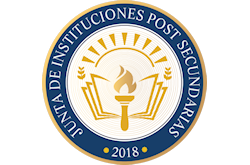 Junta de Instituciones Postsecundarias de Puerto Rico
Junta de Instituciones Postsecundarias de Puerto Rico
- 787-878-5475 Ext. 3421
- pirivera@arecibo.inter.edu
- Localización
Oficina Departamental:
Edificio B - Segundo Piso
Oficina B-209
Horario
lunes a viernes:
8:00 a.m. - 12:00 m.d.
1:00 p.m. - 5:00 p.m.
Zenaida Pitre
Asistente Administrativo
zpitre@arecibo.inter.edu
Ext. 3422
Karla Rodríguez
Técnica
krodriguez@arecibo.inter.edu
Ext. 3512
Oficina de Facultad
Ext. 3425

